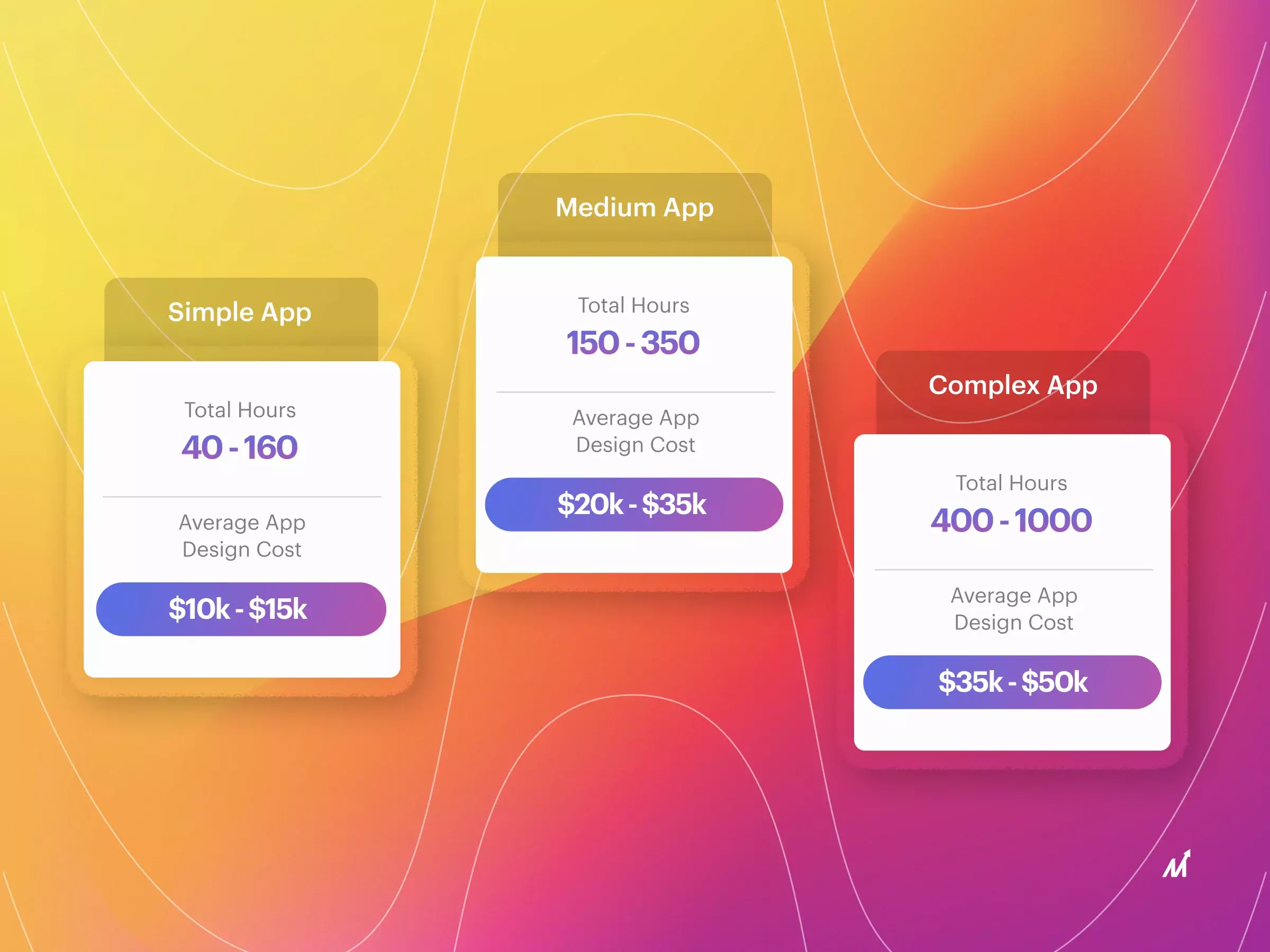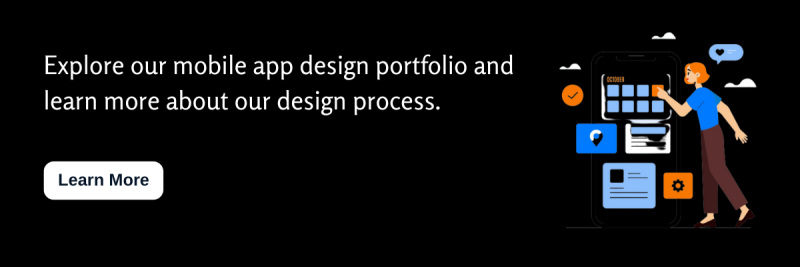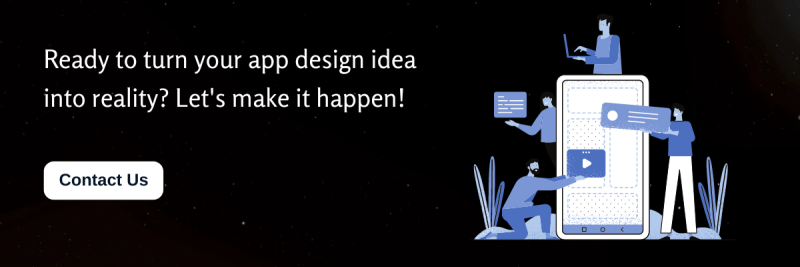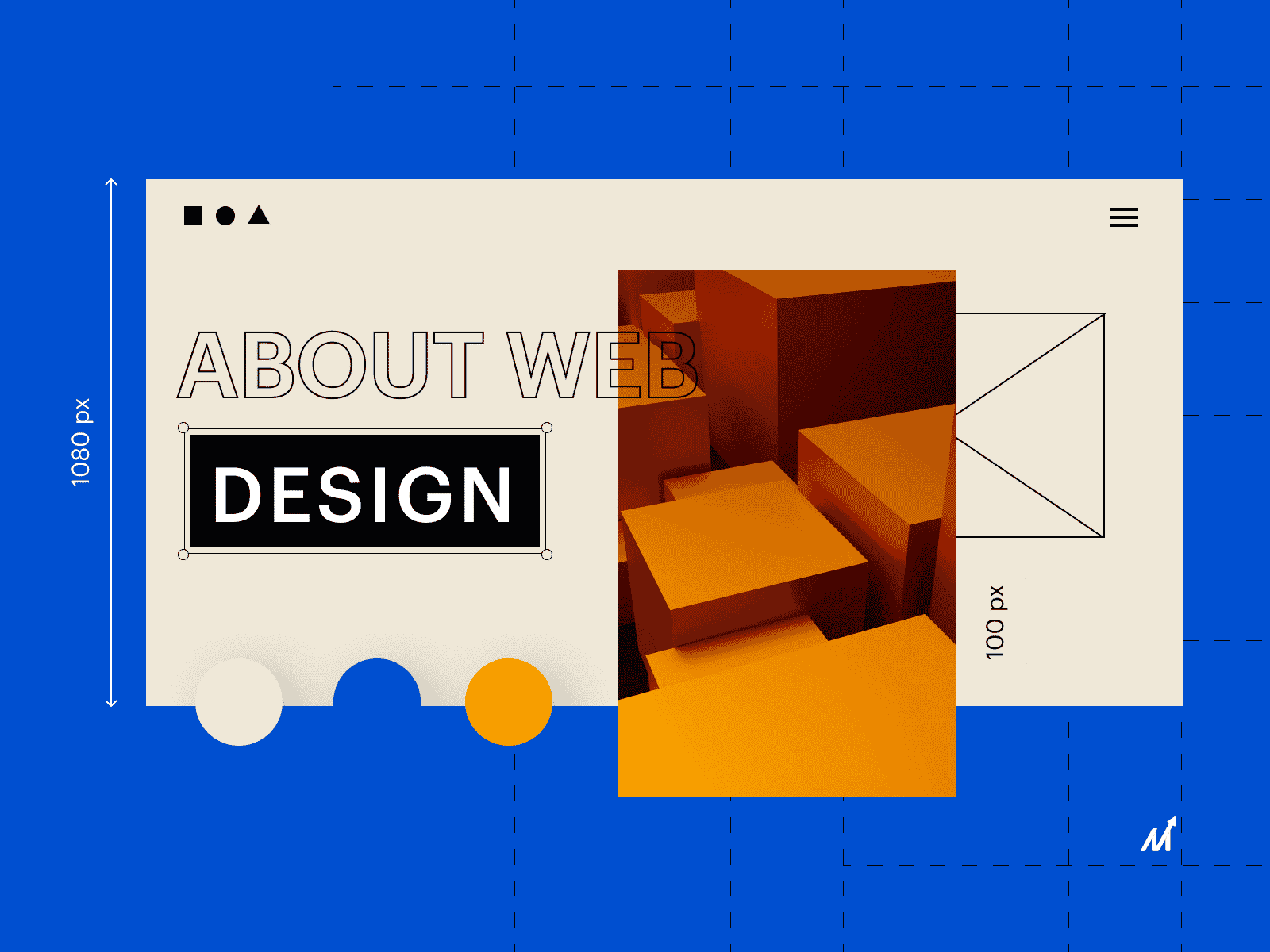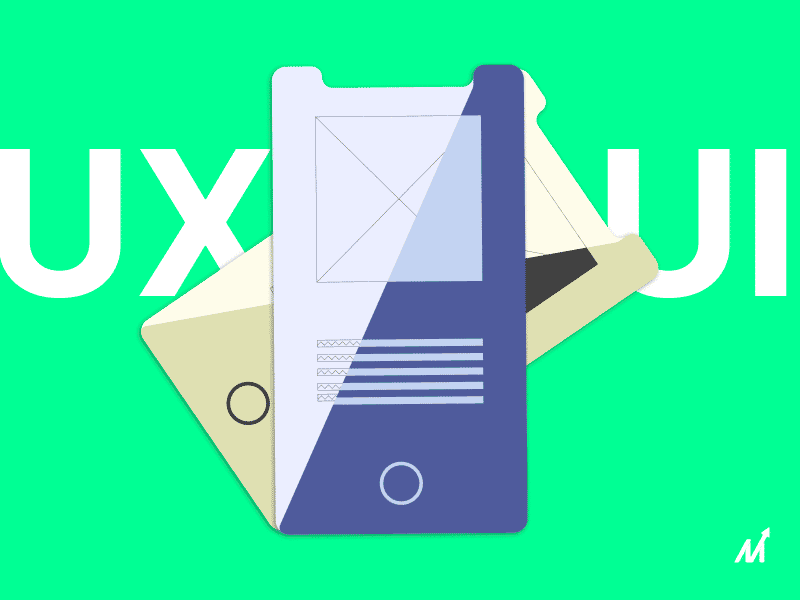The design of an app is more about its practical approach than its aesthetic appeal when creating a new app or optimizing an existing one. The app should be simple to use and have attractive designs that set it apart from the competitors. We recently published an article on how much it costs to develop an app. It’s time to estimate how much app design costs.
You can no longer launch a subpar app for the mass market and hope to gain any traction. Consider the modern mobile app selection process. We set up several of them and rapidly browse them to choose the one with all the required features and eye-catching appearances, correct?
For this reason, it’s crucial for app developers to comprehend the UX/UI cost.
- How much does designing an app cost?
- How do you ensure you don’t overpay while getting the greatest outcomes?
- How do you stop making endless UX/UI iterations?
Creating an outstanding UX is not simple. “Understand your user,” it says at the outset. How is an app user-centric, then?
To design a high-quality app, it’s crucial to identify the prerequisites, such as:
- Market size for the proposed app
- Target market tastes and preferences
- Current trends in mobile UI design
To help you start designing mobile applications, we’ll go through the key steps involved in the process, variables that affect how much an app design costs, and other critical components in this article.
Further read: Blueprint App Development: How To Design An App & Win The Market?
Factors Influencing The App Design Cost
The app design cost ranges from $10,000 to $50,000. The intricacy of the app idea, the kind of team, and the team location all play a role in this vast range.
Based on these variables, let’s look at the breakdown of app design costs.
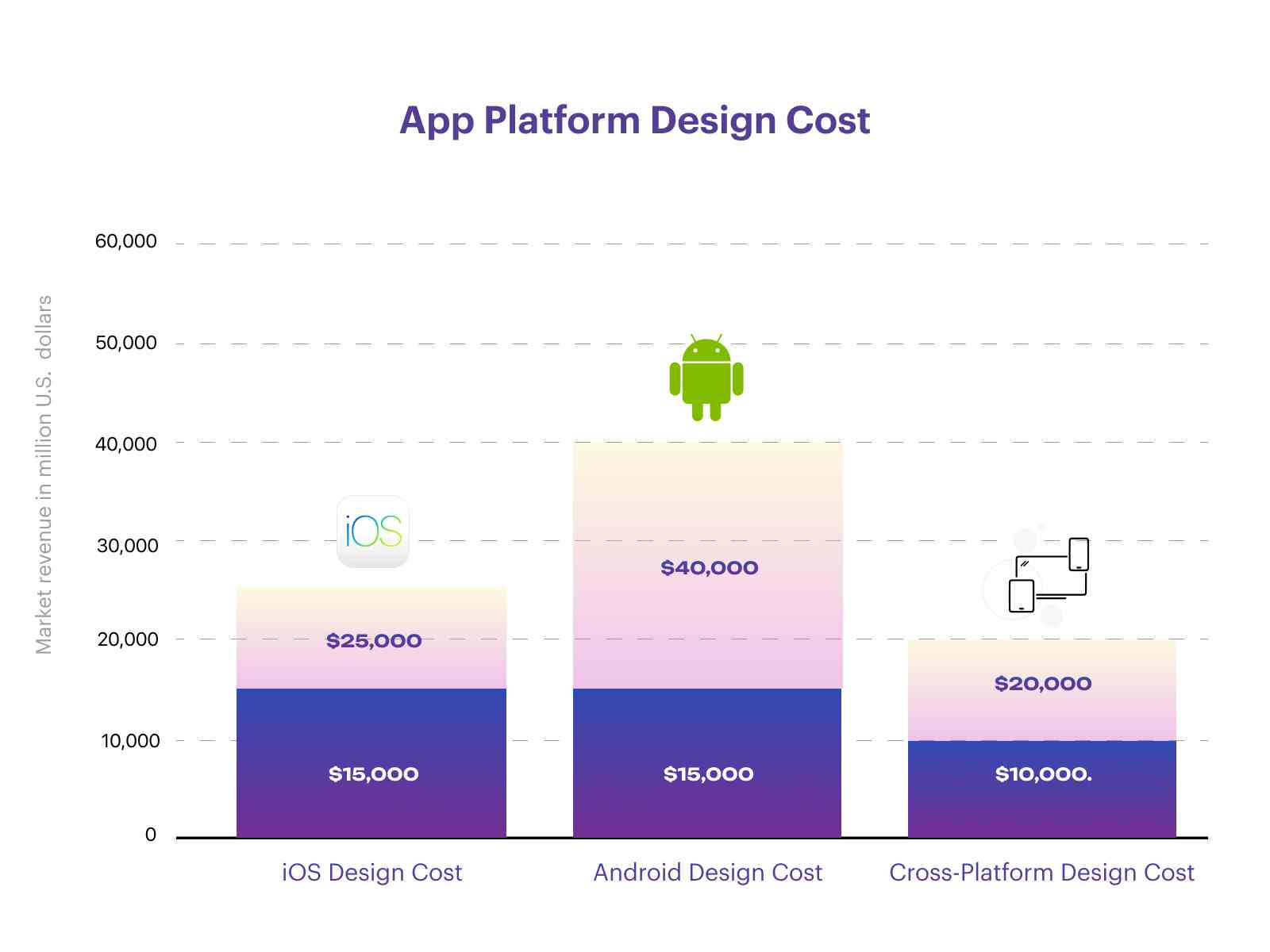
1. App Complexity
The mobile app design is made based on your product concept. Consequently, the complexity of your app idea will affect the design. Feature number, screen count, graphic design, and usability are a few examples.
Generally, a simple app’s design cost will be lower than that of a complex one. The cost of designing an app is broken down in the following table according to complexity.
- Simple App: $10,000 to $15,000
- Medium App: $20,000 to $35,000
- Complex App: $35,000 to $50,000
If you want to know the exact app design cost, contact us. The charges listed in the table are approximations.
2. App Platform
Android and iOS mobile platforms have unique UI/UX principles and nuances that users have grown to enjoy and become accustomed to. Therefore, the same app cannot have the same look and feel on Android and iPhone to increase engagement.
Even when using cross-platform development tools like React Native and Flutter, delivering a cross-platform user interface (UI) is still complex. Nevertheless, we’ll discuss this and how it relates to the costs of designing Android and iPhone apps in a moment.
- iOS App Design Cost
The iOS platform delivers the default UI kit with all necessary user interface elements and somewhat rigid UX/UI guidelines for developers and designers. Thus, designing an iPhone app is a relatively simple procedure.
An iOS app design costs around $15,000- $25,000.
- Android App Design Cost
Due to the vast array of device form factors and screen resolutions, things are a little more complicated in Android. As a result, designers spend more time enhancing UX/UIs for various devices.
Generally speaking, it takes 1.3 times more time to design the same UX/UI for Android than for iOS.
An Android app design costs around $15,000- $40,000.
- Cross-Platform App Design Cost
While designing applications for React Native or Flutter, we can use specialized UI kits that enable the reuse of UI elements across both mobile platforms. Nonetheless, we can still adhere to the platforms’ look-and-feel standards:
- Material Design
- Human Interface Guidelines
A Cross-Platform app design costs around $10,000- $20,000.
3. App Types
Using native stock UI elements or building everything from scratch is one of the significant variables influencing how much it will cost to design a mobile app.
- Custom UX/UI
Mobile games are perfect examples of custom-designed applications. This is because each game must differentiate itself from others and feel distinctive, a concept that naturally extends to some extent to other mobile applications.
Nevertheless, building mobile apps with unique aesthetics takes much more work than simply modifying and reusing native graphic design elements.
- Stock UX/UI
Both Apple and Google offer UI kits containing well-known interface design elements like search boxes, input fields, numerous buttons, controllers, icons, fonts, colors, etc. So, using these pre-made UI libraries minimizes the cost of designing an app. In reality, the majority of mobile applications employ a mix-and-match strategy. If you prefer using mobile apps, you probably already know how uncommon it is to find completely original ones.
Usually, stock UI design elements are braided together with bespoke graphics. A custom variation will cost 1.5–2 times more than a stock substitute.
4. Type of Team
The app design cost has been divided below based on the different types of design teams, including outsourcing teams, in-house teams, and freelancers.
- Outsourcing an App Design Company
Working with an outsourcing app design company can be cost-effective as they typically have lower labor costs due to their location in other countries. However, the app design cost will depend on the company’s quality and experience.
Some outsourcing companies may have lower hourly rates but take longer to complete a project, resulting in a higher overall cost. On the other hand, a more experienced and higher quality outsourcing company may charge a higher hourly rate but may complete the project faster, resulting in a lower overall cost.
- In-house Team
Hiring an in-house team can be more expensive as the company must pay for salaries, benefits, office space, and equipment. However, having an in-house team can be beneficial as they can work closely with other departments in the company and be readily available for any design needs.
The cost will depend on the number of designers, their experience, and the company’s location.
- Freelancers
Hiring freelancers can be cost-effective as they typically have lower hourly rates than hiring an in-house team or outsourcing an app design company. However, finding the right freelancers with the necessary skills and experience can be time-consuming, and there is a risk that the freelancer may not complete the project on time or at the desired quality level.
Additionally, managing multiple freelancers can be more challenging than managing an in-house team or working with a single outsourcing app design company.
Mobile App Design Cost Based on Designing Stages
Designing a mobile app generally involves four major stages, and the price for each stage can differ based on the designer or company you engage with and the degree of detail and customization needed.
Here’s a breakdown of the average costs for each stage of mobile app design:
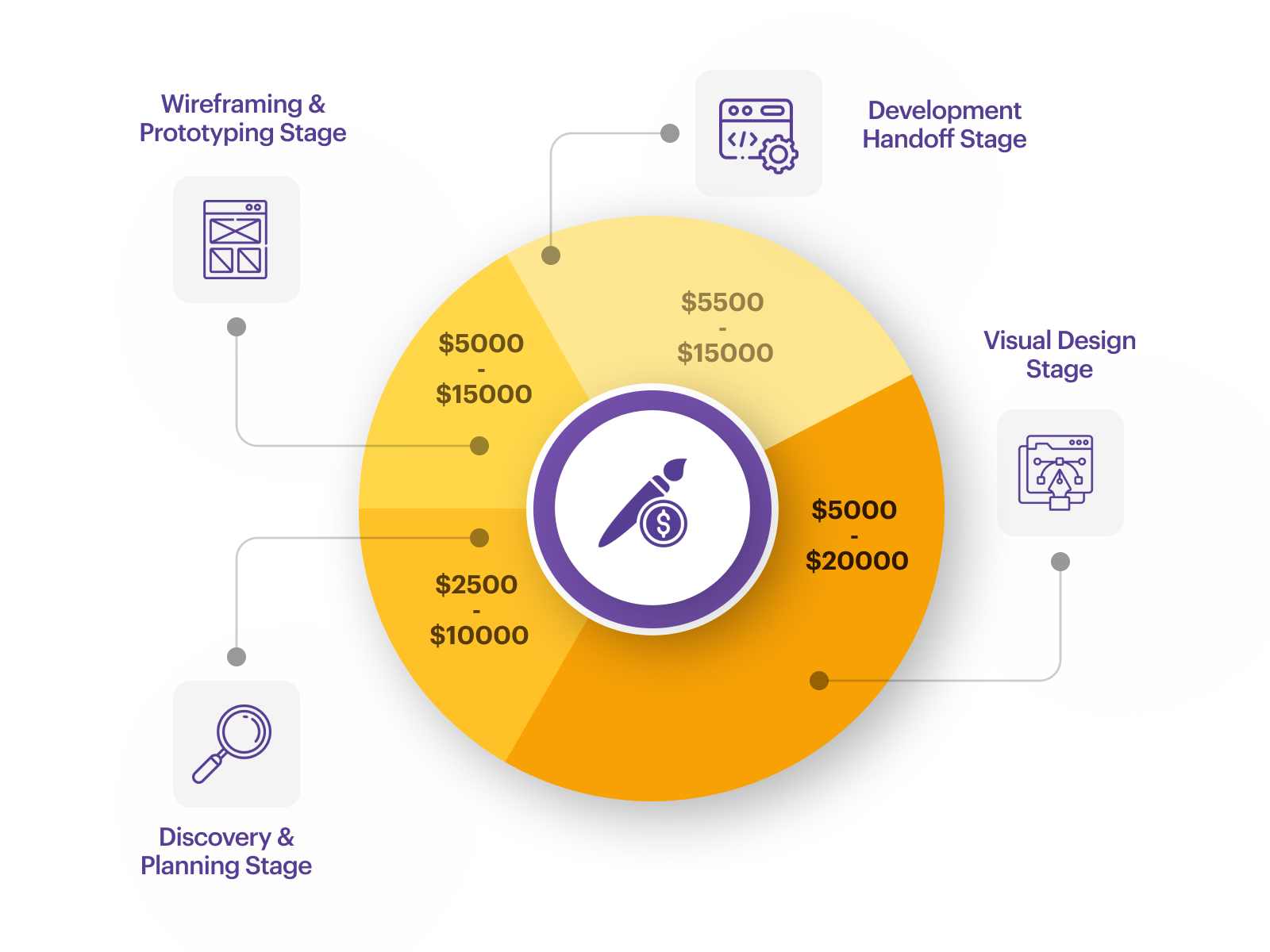
- Discovery & Planning Stage: This stage involves understanding the project requirements, identifying the target audience, creating user personas, and outlining the user flow and experience. The cost for this stage can range from $2,500 to $10,000.
- Wireframing & Prototyping Stage: Wireframing and Prototyping Stage involves creating wireframes, user interface design, and a clickable prototype to test the app’s usability. The cost for this stage can range from $5,000 to $15,000.
- Visual Design Stage: This stage involves creating the app’s visual style, color scheme, typography, and graphics. The cost for this stage can range from $5,000 to $20,000.
- Development Handoff Stage: This stage involves preparing all the design assets for the development team to begin building the app. The cost for this stage can range from $5,500 to $10,000.
The costs listed here are general estimates and will vary depending on the size and complexity of your project and the level of your design team’s expertise and experience.
Further read: How Often Should You Update UI For Mobile Apps?
Tips For Reducing App Design Cost
Designing a mobile app can be a significant investment, but there are several ways to reduce costs without compromising the quality of the final product. Here are some tips for reducing app design costs:
- Simplify Your App’s Features: The more complex your app’s features are, the more time and resources it will take to design and develop. Simplify your app’s features and focus on its core functionality to reduce design costs.
- Conduct Market Research: Conducting market research before starting the design process can help ensure that you are creating an app that meets the needs and preferences of your target audience, which can ultimately reduce design costs.
- Use Existing Design Templates: Instead of starting from scratch, consider using existing design templates or UI kits to speed up the design process and reduce costs.
- Prioritize Design Stages: Some design stages, such as wireframing and prototyping, can be more critical than others. Prioritize the most important stages to address the most significant design issues while minimizing costs.
- Work With A Reputable Design Agency: Although reputable design agencies may have higher rates, they are more likely to produce high-quality work that will reduce the risk of costly revisions or redesigns.
By implementing these tips, you can reduce your app design costs while creating a high-quality, user-friendly app.
Further read: Best Award-Winning Mobile App Designs Tips You Will Read This Year
How To Pick The Right App Design Partner?
Choosing the right app design partner can be a crucial decision in the success of your app. Here are some factors to consider when selecting an app design partner:
- Experience & Expertise: Look for an app design partner with experience designing apps similar to the one you want to build. They should deeply understand the design principles and best practices of mobile app development.
- Portfolio: Check the app design partner’s portfolio to see their past work. Look for examples of apps that have a design similar to what you have in mind. This can give you a good idea of their design style and quality.
- Communication: Good communication is essential for a successful partnership. Ensure the app design partner has good communication skills and is responsive to your queries and concerns.
- Budget: Determine your budget and look for an app design partner who can work within that budget. Avoid selecting the cheapest option, as the quality of work may suffer.
- Process & Timeline: Understand the app design partner’s design process and timeline for completing the project. Ensure that their process aligns with your needs.
App Design Process We Follow At Markovate
At Markovate, we follow a comprehensive app design process to deliver high-quality, user-friendly mobile apps that meet our client’s needs. Here is our app design process:
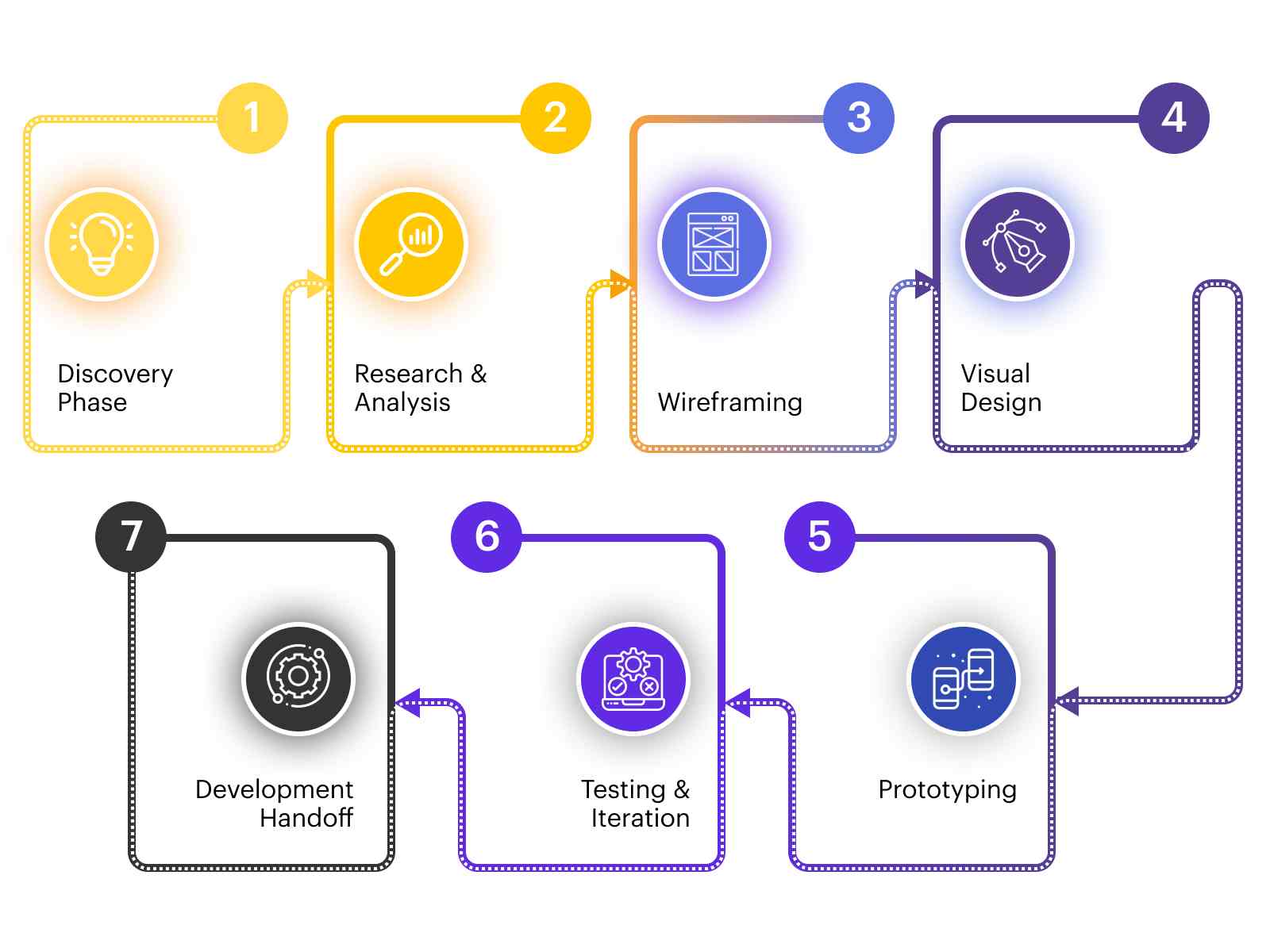
- Discovery Phase: We begin by comprehending your app’s objectives, target market, and competitors. We evaluate your needs to develop a thorough project brief specifying the scope, schedule, and cost.
- Research & Analysis: We undertake in-depth research on your target audience, competitors, and industry trends to find user demands, preferences, and market gaps. We make design decisions based on this information and develop a special value proposition for your app.
- Wireframing: Wireframes are low-fidelity prototypes that show an application’s structure and user flow. Before beginning the visual design phase, we use wireframes to evaluate and adjust the app’s usability and functionality.
- Visual Design: We create high designs using your brand identity and visual style. Our design team focuses on producing intuitive, user-friendly, aesthetically pleasing experiences.
- Prototyping: We design interactive prototypes that mimic the user interface and functionality of the app. We can test and confirm the app’s design using prototypes, find any usability problems, and make adjustments.
- Testing & Iteration: We perform user testing to get input and iteratively enhance the app’s functionality and design. With this process, we can improve the app’s design and ensure it will be useful to your target market.
- Development Handoff: Once the design is finalized, we prepare the design assets and hand them to our development team for implementation. We work closely with the development team to ensure that the design is implemented accurately and that the final product meets our design standards.
At Markovate, we strive to deliver exceptional app design services that exceed our client’s expectations. Our app design process ensures we deliver high-quality, user-friendly apps that meet our client’s goals and objectives.
Contact us right now to find out how we can assist you in achieving your company’s objectives.

I’m Rajeev Sharma, Co-Founder and CEO of Markovate, an innovative digital product development firm with a focus on AI and Machine Learning. With over a decade in the field, I’ve led key projects for major players like AT&T and IBM, specializing in mobile app development, UX design, and end-to-end product creation. Armed with a Bachelor’s Degree in Computer Science and Scrum Alliance certifications, I continue to drive technological excellence in today’s fast-paced digital landscape.


